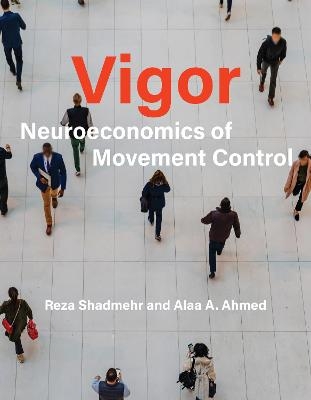
Vigor
Neuroeconomics of Movement Control
Seiten
2020
MIT Press (Verlag)
978-0-262-04405-9 (ISBN)
MIT Press (Verlag)
978-0-262-04405-9 (ISBN)
- Titel ist leider vergriffen;
keine Neuauflage - Artikel merken
Why do we reflexively run toward people we love, but only walk toward others? In Vigor, Reza Shadmehr and Alaa Ahmed examine the link between how the brain assigns value to things and how it controls our movements. They find that brain regions thought to be principally involved in decision making also affect movement vigor-and that brain regions thought to be principally responsible for movement also bias patterns of decision making.
Shadmehr and Ahmed first consider the relationship of value and vigor from a behavioral and mathematical perspective, considering a series of fascinating observations-including, for example, data showing that people in certain cities tend to walk faster than those living elsewhere-through the lens of optimal foraging theory. They then go on to explore the neural basis of vigor and valuation, synthesizing results from experiments that have measured activity in various brain structures and neuromodulators, including dopamine and serotonin. They speculate that in the future, technologies may be able to predict our personal preferences by measuring our movements; through the vigor with which we move, we unwittingly reveal one of our well-guarded secrets- how much we value the object of our attention.
Shadmehr and Ahmed first consider the relationship of value and vigor from a behavioral and mathematical perspective, considering a series of fascinating observations-including, for example, data showing that people in certain cities tend to walk faster than those living elsewhere-through the lens of optimal foraging theory. They then go on to explore the neural basis of vigor and valuation, synthesizing results from experiments that have measured activity in various brain structures and neuromodulators, including dopamine and serotonin. They speculate that in the future, technologies may be able to predict our personal preferences by measuring our movements; through the vigor with which we move, we unwittingly reveal one of our well-guarded secrets- how much we value the object of our attention.
Reza Shadmehr is Professor of Bioengineering and Professor of Neuroscience at the Johns Hopkins University School of Medicine. He is the coauthor of The Computational Neurobiology of Reaching and Pointing and Biological Learning and Control (both published by the MIT Press).
| Erscheinungsdatum | 27.07.2020 |
|---|---|
| Sprache | englisch |
| Maße | 178 x 229 mm |
| Themenwelt | Geisteswissenschaften ► Psychologie ► Allgemeine Psychologie |
| Geisteswissenschaften ► Psychologie ► Biopsychologie / Neurowissenschaften | |
| Geisteswissenschaften ► Psychologie ► Verhaltenstherapie | |
| Naturwissenschaften ► Biologie ► Humanbiologie | |
| Naturwissenschaften ► Biologie ► Zoologie | |
| ISBN-10 | 0-262-04405-6 / 0262044056 |
| ISBN-13 | 978-0-262-04405-9 / 9780262044059 |
| Zustand | Neuware |
| Informationen gemäß Produktsicherheitsverordnung (GPSR) | |
| Haben Sie eine Frage zum Produkt? |
Mehr entdecken
aus dem Bereich
aus dem Bereich
Techniken der Verhaltenstherapie
Buch (2024)
Julius Beltz GmbH & Co. KG (Verlag)
CHF 48,95


